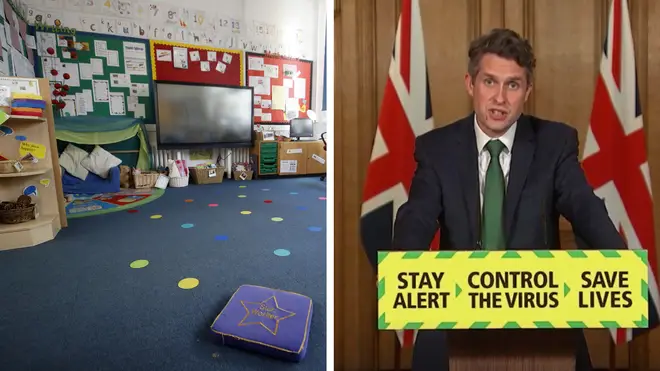
Vanessa Feltz 3pm - 6pm
2 July 2020, 18:18 | Updated: 2 July 2020, 20:27

Teacher union chief brands government's school plan "unworkable"
The teachers union chief branded the government's new school plan "unworkable" and conceded it only a little better than the "parlously poor" previous draft.
Education Secretary Gavin Williamson has announced new safety rules for schools in England that involves classes and year groups being kept apart in separate "bubbles".
Dr Mary Bouston, who saw the draft on Friday, was relieved that "there finally is some sort of plan" but said it is still not fit for purpose.
"The first plan was parlously poor, this is a little better... but this is not the plan that's needed," she said.
She explained the first plan was "unworkable", such as the suggestion to mandate which seat children sit in on their way to school - this would be impossible on public transport and extremely difficult in full capacity school buses because "kids won't do it." She added that buses are not run by the school but private companies.
Dr Bouston told Shelagh the issue with the current plan is it was "written for schools which don't exist in England and for pupil numbers that don't exist."

She said it is "not possible" for secondary school pupils to remain in separate "bubbles" while moving about in narrow corridors to attend different lessons.
Shelagh countered that Dr Bouston was speaking as though the regulations are unworkable but pupils can follow directions.
Dr Bouston said staggering the start and end of the day, the lunchtimes and playtimes may be doable, "but the idea you're not going to have mixing in very crowded schools which are so densely populated with pupils...that's not possible."
She said that year groups will mix, especially on the way to and home from school.
She added that of course she wants schools to open, "but we should have been planning for a much more ordered opening of schools, and there Labour's absolutely right, we had a long time to do that."
Options she suggested included erecting Portakabins or using community spaces as spare classrooms, enlisting the help of retired teachers to enable smaller classes, using supply teachers and hiring more newly qualified teachers who often find it hard to get a job.
The plan did not fill her with confidence that teachers and students alike would be protected from the virus, she said.